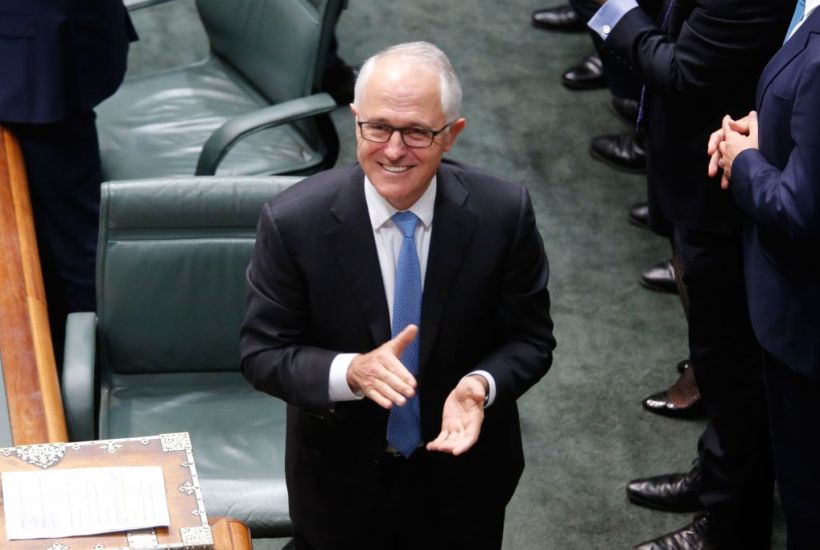The by-election wins in New England and Bennelong are cause for celebration in the Turnbull camp. Quite obviously, a crisis has been averted. But after losing 25-odd Newspolls, Turnbull still has to watch his back.
Right now, Turnbull is the Sportsbet favourite to be the Liberal leader at the next Federal election but that seems shaky. If the polling continues as it is, it is difficult to see Turnbull remaining Liberal leader in possibly eighteen months when the election is called, by which time he will have polled consistently worse than Tony Abbott or Julia Gillard.
There’s the saying ‘A week is a long time in politics’ and that has never rung truer than this past month but as much as the play may change week-to-week (and Turnbull’s newfound confidence after the Bennelong victory is a prime example), the trajectory tends to remain the same – and that trajectory for the past decade has been a revolving door of leadership, spin, focus-group driven policy, backflips and decisive defeat electoral defeat. Malcolm Turnbull, the Newspoll Prime Minister, is unlikely to break the cycle.
It’s been commonly said that Turnbull’s leadership is aided by the absence of a challenger. Unlike Rudd, who owed his leadership to a faustian pact with Julia Gillard and always had to manage an ambitious deputy, and Abbott, whose vanquished predecessor sat on the frontbench as a perpetual reminder of what might have been, Turnbull’s chief rival is not so obvious.
But that may easily change. During Gillard’s leadership there were lulls in discussion about a Rudd comeback where journalists offered the likes of Simon Crean, Stephen Smith, Greg Combet and Bill Shorten as alternative leaders until Rudd formally announced a challenge. During Abbott’s tenure, Julie Bishop and Scott Morrison were, at various points, the main contenders before Turnbull emerged. The point is that while in previous coups, there was a ready-made leadership alternative available, it is not unprecedented that a chief contender could surface once Turnbull enters the terminal stages of polling.
Had the Turnbull government continued falling at the alarming pace that it was a month ago, there is no doubt that Julie Bishop was seriously considering whether to declare herself a candidate. She has comparable support to Turnbull amongst the press gallery and would have a clear starting advantage against any other potential candidates, given her seniority. In the context of the Cabinet leaks and reported falling out between George Brandis and Malcolm Turnbull over handing some of Brandis’ ministerial responsibilities to Peter Dutton, Bishop seemed to be beneficiary in the event of a coup.
Now those developments have been paused amidst the post by-election relief and Brandis UK-bound, it is unclear whether Turnbull has dodged a potential coup or if he is left more exposed with the absence of his traditional ally. In any case, the Turnbull government is still lagging in the polls which gives opportunity for a challenger to mount an argument that there is sustained dissatisfaction for Turnbull in the polls.
Leadership spills don’t happen overnight. There has been enough of them in recent years to see clear signs. It begins with poor polling, usually brushed aside by senior members of the government (‘There’s no election for two years’). What follows is always more bad polling, backflips on policy (see the Banking Royal Commission) and refreshing the Ministry (Cabinet reshuffle, check). Then there’s op-eds about a potential leadership change, further bad polling and the odd question to a senior member of the government for them to dismiss. All of this is so ordinary that, to most people, it goes unnoticed. It’s not until there’s long-term bad polling that commentators start to draw a trajectory and conclude that the PM is in trouble (Graham Richardson and even Peter Van Onselen agree that Turnbull is in trouble). Then there’s further denials from government members that there’s a problem which are now taken less seriously.
The task of speaking the truth usually falls on partisan colleagues from outside of parliament (cue Jeff Kennett) to cut through the bullshit and say that the man is doomed. Of course there’s further bad polling and that’s about where the Turnbull government is at. There’s still the emergence of a clear leadership alternative, members of the government speaking out against the leader, a possible failed leadership spill, the mooting by the press gallery of the make-up of a potential new leadership team, Cabinet resignations and a successful spill motion. Turnbull’s doomsday clock has not yet hit midnight, but it’s on track unless there’s a dramatic turnaround.
What’s missing though in most commentaries about leadership spills is an interim stage, where suddenly it appears that things might just work out. You know that phrase ‘The night is darkest just before the dawn?’ Well it goes both ways. Sometimes the day is brightest just before dusk or the plane is soaring highest just before the crash.
Under Gillard there was speculation all throughout 2011 and 2012 that she would be replaced. Then at the end of 2012 she delivered her history-defining ‘misogyny speech’. Suddenly Gillard was showing that she would not go down without a fight. Labor went to the 2012/2013 Christmas recess with renewed confidence. Then the Gillard government came back to work to bad polls which confirmed to colleagues that the trend was irreversible and, by March, there was an attempted spill and, in June, the spill was carried.
A comparable event happened with Abbott who survived the February 2015 spill and then, to the surprise of commentators, delivered an uncontroversial budget and proceeded to go after Shorten during the Royal Commission into Union Corruption. Yet the Canning by-election and Bronwyn Bishop’s Choppergate scandal smothered the Abbott government’s attempts to clear the air and MPs made a snap judgement call on Abbott’s capacity for improvement in the polls.
Whether or not Turnbull’s recent victories are a turning point or a blip in a terminal trajectory will be clearer in the coming months.
Political commentary is too often prone to the benefit of hindsight and the temptation to paint things as a linear narrative whereby the good prime ministers (Menzies, Hawke, Howard) had constant victories and the bad (Rudd, Gillard, Abbott) were perpetually unpopular. In reality, politics is far more messy. The Howard government was, at various times, staring down a chasm of electoral disaster, Gillard may have been successful if not for the hung parliament and Turnbull would have been a Liberal Party hero if he had won 2016 decisively, or a villain if he had lost. If we pause history at any point, the events that later transpired may seem improbable. Turnbull’s fate is unknown, but much of it is out of his hands.
Politicians are conservative by nature and what unites them is motivation for another term. On balance, most politicians would prefer to fine tweak their government’s policies rather than changing the leader. When parliament sits in 2018 there will be good will towards Malcolm Turnbull from most members of the caucus, with the hope that he can build on his recent by-election victories and turn the ship around. With that said, the Choppergate scandal showed that it only takes one major mishap for a majority of the caucus to lose faith in their leader.
Turnbull had better aim to turn these successes into a long-term narrative that his government is succeeding and responding to the needs of the public or the Newspoll Prime Minister will die by the sword.
Got something to add? Join the discussion and comment below.
Got something to add? Join the discussion and comment below.
Get 10 issues for just $10
Subscribe to The Spectator Australia today for the next 10 magazine issues, plus full online access, for just $10.


























Comments
Don't miss out
Join the conversation with other Spectator Australia readers. Subscribe to leave a comment.
SUBSCRIBEAlready a subscriber? Log in